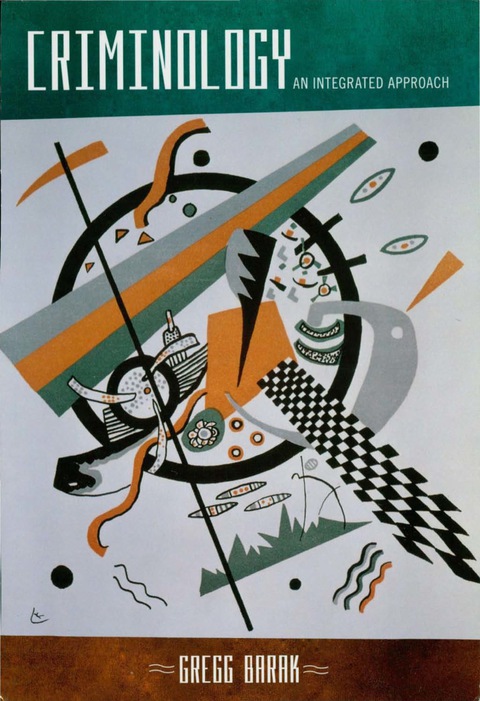Description
Efnisyfirlit
- Title Page
- Copyright Page
- Dedication
- Contents
- Preface
- Acknowledgments
- PART I. INTRODUCTION: A UNIFYING ANALYSIS OF CRIME AND CRIME CONTROL
- 1. Criminology and Criminal Justice: An Integrated Perspective
- Globalization, Criminology and Criminal Justice: Crisis, Integration, and Legitimation,
- Globalization and the Criminological Crisis,
- Globalization and Criminal Justice Policy,
- Reflexive Modernization and the Demystification of Criminology,
- Integrated Criminology as a Prelude of Things to Come,
- A Concise History of Criminological Integration,
- Pathways for Doing Integrated Criminology,
- Developmental Criminology,
- Life-Course Criminology,
- Reciprocal Criminology,
- Summary and Conclusion : Integrated Approaches to Criminology,
- Notes,
- 2. Official and Unofficial Crimes: A Domestic (U.S.) Perspective
- Criminology and the Politics of Defining Crime,
- Crime Statistics,
- Official Crimes in the United States,
- Index Crimes Plus,
- White Collar Crime,
- Organizational Crime,
- Unofficial Crimes in the United States,
- Summary and Conclusion: A Power Typology of Crime and Violence,
- Notes,
- 3. Official and Unofficial Crimes: A Global Perspective
- Beyond the Nation-State Crimes,
- An Early Snap shot of Extraordinary Transnational Crime,
- Nationally and Internationally Prosecuted Crimes,
- Nationally Prosecuted Transnational Crimes,
- Internationally Prosecuted Crimes,
- Official Transnational Crime,
- Unofficial Transnational Crime,
- Extraordinary Crimes,
- Organized Crimes,
- State-Corporate Crimes,
- Summary and Conclusion: A Crime by Any Other Name,
- Notes,
- 4. Crime Control, Risk Management, and Surveillance: Criminal Justice and Law Enforcement
- Criminal Justice Theorizing,
- Risk Management at the Front End of Crime Control,
- Situational Crime Prevention,
- Zero Tolerance Policing,
- Private Security,
- Technological Surveillance,
- Eavesdropping,
- Wiretapping,
- Closed Circuit Television,
- Computer Surveillance,
- Bait Cars,
- Surveillance Aircraft,
- GPS and RHO Tracking,
- Changing Law Enforcement Post-9/11 ,
- Homeland Security,
- Antiterrorist Laws,
- The Blurring of Warfare and Law Enforcement,
- Militarizing the Police,
- Professionalizing the Police,
- Summary and Conclusion: On the Dialectics of Crimeand Crime Control,
- Notes,
- 5. Crime Control, Dangerousness, and the Penal-Industrial Complex: Punishment and Sentencing
- A Historical Perspective on Punishment,
- Rationalizing Criminal Punishment,
- Theories of Criminal Punishment,
- Marginally Dangerous Offenders,
- Trend Data on Convicted Felons and Sentencing,
- A Profile of Incarcerated Dangerous Offenders,
- Risk Management, Predicting Dangerousness, and Sentencing Disparities,
- Crime Control and the Penal-Industrial Complex,
- Prison Labor,
- Summary and Conclusion: From Correctional Discipline to Penal Incarceration ,
- Notes,
- PART II. STRANDS OF CRIMINOLOGICAL THOUGHT: EXPLAINING CRIMINAL BEHAVIOR AND CRIME
- 6. On the Foundations of Criminological Inquiry: Contributions in Time and Space
- Traditional Histories: Social Thought and Revolutionary Idealism ,
- Revisionist Histories : On the Order of Things,
- A Political-Economic History: A Heuristic of Criminological Strands,
- Mercantilism and the Rise of State Criminology,
- Legalistic Strands,
- Biopsychological Strands,
- Sociological Strands,
- Laissez-faire and the Rise of Disciplinary Criminology,
- Biopsychological Strands,
- Biosocial Strands,
- Sociological Strands,
- Globalization and the Rise of Transnational Criminology,
- Summary and Conclusion: A Dynamic Criminology for theTwenty-first Century,
- Notes,
- 7. Interest and Rationality: Contributions from Economics and Law
- Economic Models and Rational Choice Theories,
- Critiques of Legal Formalism and Criminalization,
- From Torts to Felonies,
- Mercantilism , Dangerousness, and the Emergence of Criminal Law,
- From Felonies to Torts,
- Regulated to Deregulated Corporations,
- Corporate Abuse , Regulatory Law, and Consumer Protection,
- Summary and Conclusion: Rational Interests as Normative Deviance,
- Notes,
- 8. Nature and Nurture: Contributions from Biology
- Nature and Nurture: On Biological and Cultural Evolution,
- Biosocial Criminology,
- Genetic Factors and Criminality,
- Twin and Adoption Studies,
- Gene-Environment Interaction and Correlation,
- Risk Factors and Criminal Behavior,
- Evolutionary Factors and Criminality,
- Evolutionary Theories of Gendered Violence,
- Neurohormonal Factors and Criminality,
- Brain Structure, Neuroscience, and Behavior: The Basics,
- Neurohormonal Theories of Criminal Behavior,
- Summary and Conclusion: Wider Propositions for Crime Prevention,
- Notes,
- 9. Mind and Character: Contributions from Psychology
- Biopsychological Approaches to Criminal Behavior,
- Psychoanalytic and Psychodynamic Approaches to Criminal Behavior,
- Psychoanalytic Personality Theory,
- Psychoanalytic and Psychodynamic Theories of Criminality,
- Behavioral and Social Learning Approaches to Criminal Behavior,
- Temperament and Development,
- Personality Approaches to Criminal Behavior: Trait-Based, Impulsive, and Antisocial,
- Cognitive Approaches to Criminal Behavior,
- Summary and Conclusion: Mental Illness, Criminality, and the Law,
- Notes,
- 10. Culture and Society: Contributions from Sociology
- Social Organization and Structural Approaches to Crime,
- Social Disorganization and Social Ecology Theories,
- Anomie and Strain Theories,
- Subcultural Theories,
- Social Process and Control Approaches to Crime,
- Social Process Theories,
- Control Theories,
- Social Power and Critical Approaches to Crime,
- Labeling and Social Construction Theories,
- Conflict and Marxist Theories,
- Feminist and Gender Theories,
- Anarchism and Peacemaking Theories,
- Constitutive Theories,
- Summary and Conclusion: Reciprocal Explanations,
- Notes,
- PART III. INTEGRATING CRIMINOLOGICAL STRANDS: THEORY AND PRACTICE
- 11. Integrated Models in an Age of Globalization and Transdisciplinarity: An Eclectic Overview of Em
- The Prism of Crime,
- The Constitutive Parts of an Integrated Definition of Crime,
- Social Agreement,
- Probable Social Response,
- Individual and Social Harm,
- Extent of Victimization,
- Integrating the Dimensions of the Prism of Crime,
- Integrated Criminological Frames of Reference,
- An Integrated Systems Theory of Antisocial Behavior: Matt Robinson,
- Toward an Integration of Sociological and Public Health Perspectives in the Study of Violence: Willi
- Integrating the Study of Mythogenes and Myths: Shlomo Shoham,
- An Integrated Understanding of the Holocaust: David Friedrichs,
- Understanding the Holocaust in Terms of Criminality,
- Understanding the Holocaust in Terms of Crime,
- Understanding the Holocaust in Terms of Criminalization,
- Toward an Integrated Social Psychological Model of White Supremacist Behavior: Michael Arena and Bru
- Integrating Critical Race Theory and Postmodernism: Implications of Race, Class, and Gender: Christo
- Integrating Buddhist Philosophy and Peacemaking Criminology:John Walsh,
- Integration by Way of the Criminology of Hybrids: Sheila Brown,
- Summary and Conclusion: The Integrative Imagination,
- Notes,
- 12. Crime, Globalization, and the Capitalist World Order: Implications for Criminology and Strategie
- Crime and Crime Control at the Turn of the Twenty-first Century,
- Security, Privatization, and Neoliberal Globalization,
- A Global Dangerous Class,
- A Global Criminology,
- Strategies and Recommendations for Justice,
- Domestic Polices for Criminal Reduction and Crime Control―United States,
- Lawmaking,
- Investing in Social Capital,
- Investing in Harm Reduction ,
- Law Enforcement,
- Professionalizing the Police,
- Reaffirming Due Process and Equal Protection
- De-escalating the War on Crime,
- Controlling Police Corruption,
- Enriching Community Control,
- Adjudication,
- Improving Representation and Technology for Indigent Defandants,
- Corrections,
- Abandoning Mandatory Sentences, Closure of Supermax Prisons, and Abolishing Capital Punishment,
- A Moratorium on Prison Construction and Inmate “Slave” Labor,
- Intermediate Sanctions and Community-Based Alternatives,
- Human Service Delivery,
- International Policies in Support of Human Needs, Human Rights, and Human Justness,
- Human Needs,
- Human Rights,
- Human Justness,
- Privatization, Government, and Public Accountability,
- Extraordinary Crimes, Sociolegal Reconstruction, and International Accountability,
- Notes,
- Index
- About the Author






Reviews
There are no reviews yet.